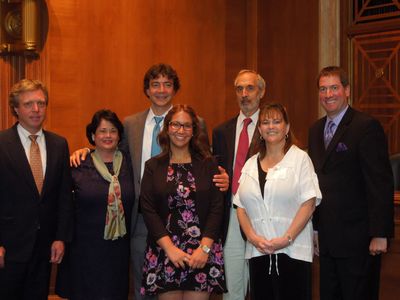“Out of the hottest fire comes the strongest steel.” Chinese Proverb
The Asbestos Disease Awareness Organization (ADAO), the largest independent asbestos victims’ organization in the U.S., is pleased to join other NGOs in the Safer Chemicals, Healthy Family coalition’s mission to reform the Toxic Substances Control Act (TSCA), the principal federal law governing the use and safety of the thousands of chemicals we are exposed to in our everyday lives. TSCA was passed more than 30 years ago and is grossly out of date. ADAO has been a stakeholder in discussions with Congressional leadership since 2004. You can read my personal journey, and how I came to advocate for this issue here.
As I remind Congress, “History is a great teacher to those who listen.”
Science and technology have made exponential advancements. As a mother and mesothelioma widow, I know the Safer Chemicals, Healthy Family coalition’s efforts will improve lives if Congress can draft and pass legislation to protect public health and our environment. I see hope on the horizon, but we have stalled. Bipartisan support is essential in getting a bill to the President’s desk, but we face a hurdle with the Chemical Safety Improvement Act (CSIA).
ADAO opposes the current language of CSIA, due to deep concerns that the bill as currently written does not deliver meaningful reform to TSCA and does not adequately protect Americans from the worst toxic chemicals.
The San Francisco Chronicle newspaper inaccurately stated that the Chemical Safety Improvement Act is “backed, with caveats, by a coalition of 450 environmental and public health groups called Safer Chemicals, Healthy Families.” In reality, ADAO, along with the majority of other public health and environmental organizations, consider the bill to have the following five critical flaws:
- Next to Impossible to Phase Out or Ban Harmful Chemicals. CSIA would make it impossible for EPA (the Environmental Protection Agency) to ban or phase out the worst of the worst toxic chemicals on the market.
- Grossly Inadequate Safety Standard. CSIA’s safety standard would place a heavy burden on the EPA to find that a chemical is unsafe, rather than shifting the burden to chemical companies to show chemicals are safe.
- Lack of Deadlines to Ensure Safety. CSIA is virtually devoid of any deadlines that would require EPA to act quickly to assess and restrict the use of harmful chemicals.
- Unworkable Standard of Court Review. CSIA would retain the unworkable standard of court review found in TSCA, which ultimately prevented EPA from being able to ban asbestos in 1989.
- Freeze on State Efforts to Protect People from Chemicals. CSIA contains far-reaching language that would paralyze states from being able to enforce existing laws or pass new ones, to increase protections against harmful chemicals.
Ignorance isn’t bliss, it’s deadly.
Each year, 10,000 Americans die from preventable asbestos-related diseases. Occupational, environmental, and consumer asbestos exposure continues throughout the nation, jeopardizing the health of countless men, women, and children. As Congress works to reform TSCA, ADAO urges members to address our above concerns regarding CSIA’s critical flaws. The time is now for Congress to take action to protect American families from toxic chemicals, restore consumer confidence, and prevent environmental disasters from toxic chemicals.
ADAO respectfully remains engaged in the Safer Chemicals, Healthy Family coalition’s efforts to pass a bill that protects public health and the environment. Congress may be hamstrung with some issues, but this is simple – we can and must reduce and eliminate toxic exposures.
ADAO remains committed to getting the job done – and I know that we can and must work together on TSCA reform. I’m feeling the heat of the fire, but I know that together we will get a bill passed for today and for generations to come.
Note from Safer Chemicals, Healthy Families: Our coalition position on the Chemical Safety Improvement Act can be found here.




